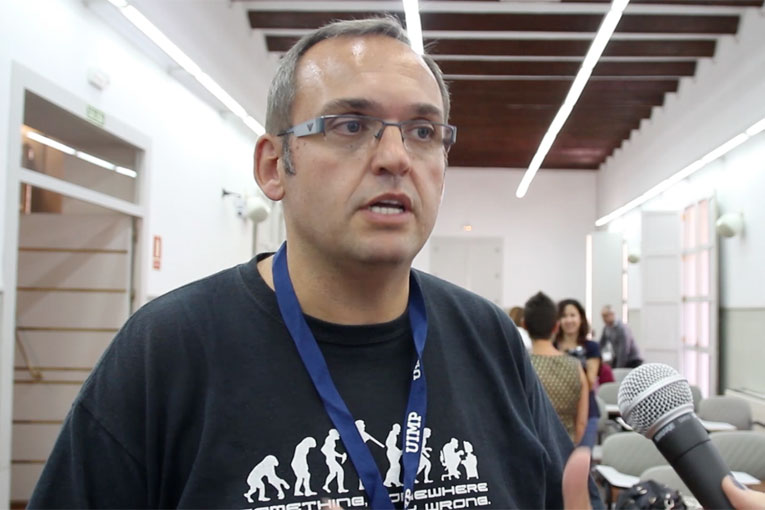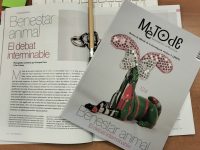|
In the year 2003, a new blog started to surface on the Internet. It was named Microsiervos, and it was a space where humour, accuracy and proximity to topics such as ecology, photography, aviation or science intertwined. A miscellaneous and personal blog written by three friends who wanted to show the last news on the topics they liked to anyone who was interested. Ten years later, Microsiervos is a successful blog with a lot of readers and they found their symbol of identity, which differentiates them from the rest of science blogs: bring science closer to the audience in an entertaining and enjoyable way without abandoning rigour. Javier Pedreira, also known as Wicho, claims that much. The science communicator is a believer on the power of the Internet as an important media tool, as long as whatever you publish is rigorously verified. That is why, despite the familiar and casual character of Microsiervos, its creators make an effort to create one hundred per cent trustworthy and valid content. Wicho says he does it because he likes it and because, despite his information technology education, he has been interested in science news since he was a boy. And after his contribution to the seminar «Science and the Press», organized by Mètode, he talked to us about his feelings regarding the Internet as a means to communicate science, the qualities of a good communicator and the situation of science journalism in Spain.
Do you believe the public is interested in science?
I think they are, more and more each day. Some days ago, science was offered very little space in traditional media, and it was allegedly due to the lack of interest of the audience. But I think a lot of change has come with the Internet and new technologies. Younger people are using the Internet more and more to look for science information, so I guess they are indeed interested in science.
Despite that interest, it seems is not easy for the reader to find science information in the media. Do you think science has more impact in small, almost personal blogs such as Microsiervos, instead of in traditional media?
Yes, I have no doubt about that. The truth is blog writers usually do that as a hobby, although there are more official of company blogs every day. But if we understand blogs as personal or group websites we have the liberty to choose what we write about. And I always say it is one of the biggest advantages we have. While a writer in traditional media sits and writes what the boss ordered, we, bloggers, write about what we want. And that is noticeable because you do it with care. You do not write of something you do not want to, and you like what you write about. And I insist, this can be noticed.
You defend the idea that it is not necessary to be scientist or a journalist to communicate science, as is your case. But what qualities do science communicators need?
I believe the most important thing is eagerness to provide information, and also a passion for science. When you decide to write about science because you like it, because you feel real passion for whatever you are talking about, everything goes with the flow. I did not choose science communication consciously. It happens to a lot of bloggers or people who write about science. We are just interested on the topic. We like to tell stories and learn about the things we write about as we research. We see the whys and wherefores of the matter, we explain and sometimes someone makes comments on the article. It is a personal satisfaction to look at the feedback.
You decided to create your project as a web portal. However, is it difficult to fund a science and technology blog on the Internet?
I guess it must be very difficult. But the thing is Microsiervos’s intention was never to make money, there was not a business plan to go with it. We created it because we wanted to, all three of us like to write and we thought it might be fun. Over time, different companies came to us for advertising, or because they wanted to do something with us. Therefore, it was very simple in our case. It is also true that we chose not to deal actively with advertising, but to hire someone who knew about sponsoring. We had no idea of how that world worked, and the blog was starting to reach a relevant point, so we decided to speak to someone so he could take care of it. They get their commission and we can focus on what we understand and like. Could we make more money if we took care of it directly? Yes, but we would lose writing time. So in our case, regarding funding, it was more a matter of luck. I understand it must be difficult, the way everything works today, and it has been, for many projects that started with the idea of being profitable. And the worst thing is they are really good projects, but it is difficult to start. They barely scrape by, but given their quality, they should be doing much better.
And speaking of content quality, a lot of people question the quality of science information found on the Internet. What are the advantages and disadvantages the Internet offers science information?
The main advantage is that the amount of information present on the Internet would not reach the audience through traditional media. Only a tiny fraction of science information gets to traditional media. On the Internet, however, you can find everything about science. It is true, though, that sometimes you find biased, misinterpreted or plainly wrong documents. But that is the reason we need an education on critical thinking and on filtering. We need to be able to understand the reasons behind the things on the Internet.
Andrea González Garrigas. Journalist.
© Mètode 2013.
|
|
«When you decide to write about science because you like it, because you feel real passion for whatever you are talking about, everything goes with the flow»
«Only a tiny fraction of science information gets to traditional media. On the Internet, however, you can find everything about science.»
|

 Mètode
Mètode




